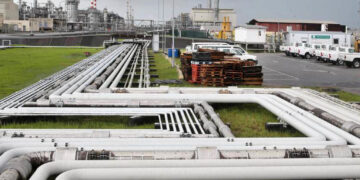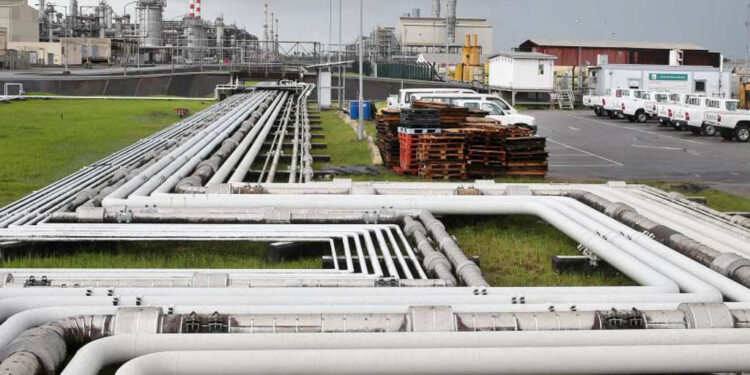By Onyemaechi Nnodim
After the spectacular Nigerian Content attainment in Total’s Egina Deepwater project and the subsequent lull in Final Investment Decision (FID) in the industry, the next big project in the offing is the NLNG Train 7. This explains the huge excitement and broad accolades for the Train 7 FID, when it was taken December 2019 and the award of the Engineering, Procurement and Construction (EPC) contract to SCD Consortium of Saipem, Chiyoda and Daewoo on 13th May 2020.
Since the official announcement of the contract award and the performance of the Groundbreaking event by President Muhammadu Buhari in June 2021, the mood in the industry has been understandably upbeat, particularly among indigenous service companies who play in the areas of engineering, fabrication, and welding. Train 7 project offers the local service providers great hope of survival after the ravages of the Coronavirus pandemic and slow economic recovery. The hope of indigenous service providers was buoyed by the knowledge of Train 7 Nigerian Content scope and the assuring remarks of Engr. Simbi Wabote, Executive Secretary, NCDMB during the NLNG Train 7 Contract Signing Ceremony, when he pointed out that “The Train 7 scope on fabrication will bring many of Nigeria’s fabrication yards roaring back into life with over 70,000 tonnes of in-country fabrication, covering condensate stabilization units, tanks, pipe racks, flare systems, non-cryogenic vessels and many other spools and fittings”.
Besides, NLNG commitment on Nigerian Content work scope on fabrication, the expectation of the local service providers in Train 7 is very well grounded and further underpinned by section 53 of the NOGICD Act, which provides that “From the commencement of this Act, all operators, project promoters, contractors and any other entity engaged in the Nigerian oil and gas industry shall carry out all fabrication and welding activities in country”. The NOGICD Act talks of “… all fabrication and welding activities in the country”. This is remarkable. This section recognizes the importance fabrication to engineering activities and industrial development. And from the number of fab yards and tested capacity, demonstrated under Egina, there is no gainsaying the fact that most, if not all forms of fabrication can now be caried out in-country.
By the way, what does fabrication and welding really entail? In lay terms, fabrication is simply the process of constructing products by combining typically standardised parts using one or more individual processes. It involves cutting, forming, punching, shearing, stamping, and welding. It is used to cut, shape or mold raw material (steel or metal) into a final product.
There are two types of fabrication, namely steel fabrication, and metal fabrication. Steel fabrication involves manufacturing steel components for specific usage in steel structures. The processes include cutting, bending, and assembling. Metal fabrication involves forming a complete assembly made from smaller sub-assemblies for use with readily available standard sections.
Welding on the other hand simply entails joining two or more pieces of metal together utilizing a combination of heat and pressure.
These definitions help to keep in view what each activity contemplated in the section 53 of the NOGICD Act entails. Again, it helps to illustrate the point that these activities have been happening big time in Nigeria, at least since Egina.
Even though steel structure projects involve some complexities in construction, schedule and delivery which must be considered at the planning stage to ensure efficiency in terms of delivery time and project cost, it is not necessarily a rocket science. Besides, Egina demonstrated ample fabrication capacity and capability in-country, which a new oil and gas project need to build on and possibly surpass.
There are strong feelers by industry watchers of subterranean moves to short-change indigenous fabrication companies under the pretence that existing fab yards in Nigeria do not have the required capacity to carry out steel structure fabrication required for Train 7. This is not provable, and stakeholders are watching keenly. NCDMB and other relevant government agencies (including the National Assembly), needs to take note of others relevant government agencies of this brooding development. The misgiving about existing in-country fabrication capacity is misconceived and baseless.
Apart from the phenomenal feats performed by various fab yards in Nigeria under Egina, there is even a recent independent assessment report of in-country steel structures fabrication and galvanizing capacity undertaken by KPMG. The Report released few weeks ago, contains current cumulative in-country capacity for steel structures based on eleven (11) fabrication yards surveyed, which is put at approximately 40,260 T/Annum for steel structure fabrication against the less than 30,000T/Annum required for the Train 7 project.
The Fab Yards surveyed are those of Aveon, Dorman Long, Sparkwest Steel Industry, Ariosh, EWT, SDEM Erectors, Lee Engineering, MG Vowgas, Seflame, DeGrills Integrated, and Nivafer Steel Construction all located within the country to provide services to the industry and create employment oppotunities.
According to the report, six (6) out of the eleven (11) Yards surveyed have demonstrable capacity to meet all the specifications requirements for the NLNG Train 7 project. The other five (5) can fabricate steel structures consistent with some typical drawings listed in the specification for Steel Structure Project Agreement Document for the NLNG Train 7.
In addition, two (2) out of the eleven (11) Fab Yards have joint in-country galvanizing capacity of 162, 000T/Annum.
The said KPMG Report considered the current carrying capacity and available equipment, manpower availability in terms of number and qualification and angle profile and beam processing lines. These are the key parameters used to validate the survey.
It is important to recognize the economic benefits of awarding all components of fabrication works for NLNG Train 7 to indigenous service providers. This is a sure way to spur job creation, increase capital retention and accelerate the attainment of NCDMB’s Ten-Year Strategic Target of growing Nigerian Content to 70% by 2027. Of course, engaging the local fab yards will further boost their capacity and capability.
It is hoped that NCDMB and other stakeholders will see this article as whistle-blowing action to monitor closing the evolving contracting milieu for the NLNG Train 7 and take firm steps to ensure that NLNG and its lead contractors are made to honour the requirements of section 53 of the NOGICD Act and take deliberate and systematic measures to utilize the enormous fabrication capacity and capability currently existing in Nigeria.
Specifically, the consortium led by SAIPEM with its vaunted in-country capacity and commitment to patronise local fab yards as a basis for its getting the Train 7 contract needs to hold up to the obligation. Any manoeuvring to bypass or frustrate this commitment to the Nigeria Content scope in Train 7 is evident that SAIPEM’s local content claims is all a façade and smokescreen to corner a key project meant to breathe life into Nigeria’s oil and gas industry. Train 7 is a veritable opportunity to scale up Nigerian Content Performance. Nigeria cannot afford to miss the opportunity.



































